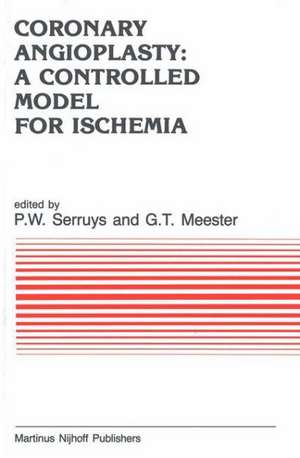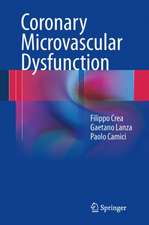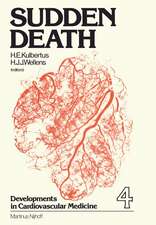Coronary Angioplasty: A Controlled Model for Ischemia: Developments in Cardiovascular Medicine, cartea 58
Editat de P.W. Serruys, G.T. Meesteren Limba Engleză Paperback – 14 oct 2011
| Toate formatele și edițiile | Preț | Express |
|---|---|---|
| Paperback (1) | 1405.13 lei 6-8 săpt. | |
| SPRINGER NETHERLANDS – 14 oct 2011 | 1405.13 lei 6-8 săpt. | |
| Hardback (1) | 1412.43 lei 6-8 săpt. | |
| SPRINGER NETHERLANDS – 31 oct 1986 | 1412.43 lei 6-8 săpt. |
Din seria Developments in Cardiovascular Medicine
- 5%
 Preț: 1484.50 lei
Preț: 1484.50 lei - 5%
 Preț: 375.17 lei
Preț: 375.17 lei - 5%
 Preț: 354.10 lei
Preț: 354.10 lei - 5%
 Preț: 1419.03 lei
Preț: 1419.03 lei - 5%
 Preț: 376.43 lei
Preț: 376.43 lei - 5%
 Preț: 1098.27 lei
Preț: 1098.27 lei - 5%
 Preț: 1438.38 lei
Preț: 1438.38 lei - 5%
 Preț: 376.78 lei
Preț: 376.78 lei - 5%
 Preț: 368.37 lei
Preț: 368.37 lei - 5%
 Preț: 380.25 lei
Preț: 380.25 lei - 5%
 Preț: 2117.58 lei
Preț: 2117.58 lei - 5%
 Preț: 367.28 lei
Preț: 367.28 lei - 5%
 Preț: 366.56 lei
Preț: 366.56 lei - 5%
 Preț: 371.10 lei
Preț: 371.10 lei - 5%
 Preț: 370.94 lei
Preț: 370.94 lei - 5%
 Preț: 783.18 lei
Preț: 783.18 lei - 5%
 Preț: 713.18 lei
Preț: 713.18 lei - 5%
 Preț: 1098.27 lei
Preț: 1098.27 lei - 5%
 Preț: 375.49 lei
Preț: 375.49 lei - 5%
 Preț: 373.47 lei
Preț: 373.47 lei - 5%
 Preț: 723.93 lei
Preț: 723.93 lei - 5%
 Preț: 1104.13 lei
Preț: 1104.13 lei - 5%
 Preț: 2117.20 lei
Preț: 2117.20 lei - 5%
 Preț: 716.09 lei
Preț: 716.09 lei - 5%
 Preț: 372.03 lei
Preț: 372.03 lei - 5%
 Preț: 722.33 lei
Preț: 722.33 lei - 5%
 Preț: 660.07 lei
Preț: 660.07 lei - 5%
 Preț: 375.34 lei
Preț: 375.34 lei - 5%
 Preț: 1423.22 lei
Preț: 1423.22 lei - 5%
 Preț: 715.35 lei
Preț: 715.35 lei - 5%
 Preț: 790.69 lei
Preț: 790.69 lei - 5%
 Preț: 720.68 lei
Preț: 720.68 lei - 5%
 Preț: 3185.49 lei
Preț: 3185.49 lei - 5%
 Preț: 1418.27 lei
Preț: 1418.27 lei - 5%
 Preț: 784.64 lei
Preț: 784.64 lei - 5%
 Preț: 714.63 lei
Preț: 714.63 lei - 5%
 Preț: 370.74 lei
Preț: 370.74 lei - 5%
 Preț: 376.22 lei
Preț: 376.22 lei - 5%
 Preț: 660.85 lei
Preț: 660.85 lei - 5%
 Preț: 368.37 lei
Preț: 368.37 lei
Preț: 1405.13 lei
Preț vechi: 1479.08 lei
-5% Nou
Puncte Express: 2108
Preț estimativ în valută:
268.86€ • 280.72$ • 222.52£
268.86€ • 280.72$ • 222.52£
Carte tipărită la comandă
Livrare economică 05-19 aprilie
Preluare comenzi: 021 569.72.76
Specificații
ISBN-13: 9789401084093
ISBN-10: 9401084092
Pagini: 212
Ilustrații: XX, 188 p.
Dimensiuni: 155 x 235 x 11 mm
Greutate: 0.3 kg
Ediția:Softcover reprint of the original 1st ed. 1986
Editura: SPRINGER NETHERLANDS
Colecția Springer
Seria Developments in Cardiovascular Medicine
Locul publicării:Dordrecht, Netherlands
ISBN-10: 9401084092
Pagini: 212
Ilustrații: XX, 188 p.
Dimensiuni: 155 x 235 x 11 mm
Greutate: 0.3 kg
Ediția:Softcover reprint of the original 1st ed. 1986
Editura: SPRINGER NETHERLANDS
Colecția Springer
Seria Developments in Cardiovascular Medicine
Locul publicării:Dordrecht, Netherlands
Public țintă
ResearchCuprins
1. Effects of acute myocardial ischemia and reperfusion in conscious animals.- Instrumentation techniques for measurements of regional myocardial function in conscious animals.- Relationship between reduction in regional blood flow and myocardial function.- Adjustment to global LV ischemia.- Adjustment to regional myocardial ischemia.- Effects of reperfusion.- Enzyme leakage from ischemic myocardium.- Summary.- References.- 2. Early changes in wall thickness and epicardial wall motion during coronary angioplasty in man. Similarities with in vitro and in vivo model.- Echocardiographic changes in wall thickness.- Changes in epicardial wall motion.- Regional marker motion.- Analysis of pressure-derived indexes during systole and diastole.- Results.- Changes in regional epicardial wall motion.- Changes in global left ventricular function.- Discussion.- References.- 3. Intracoronary electrocardiogram during transluminal coronary angioplasty.- and methods.- Results.- Discussion.- References.- 4. Clinical, electrocardiographic and hemodynamic changes during coronary angioplasty. Influence of nitroglycerine and nifedipine.- Methods.- Results.- Discussion.- Summary.- References.- 5. Wall thickening and motion in transient myocardial ischemia: Similarities and discrepancies between different models of ischemia in man (Prinzmetal’s angina, coronary angioplasty, Dipyridamole test).- Echocardiographic markers of ischemia.- The clinical model of transmural vasospastic ischemia and coronary angioplasty.- Evaluating the site of myocardial ischemia before coronary angioplasty: a role for the Dipyridamole-echocardiography test.- References.- 6. Effect of prolonged balloon inflations on hemodynamics and coronary flow with respect to balloon position in patients undergoing coronaryangioplasty.- Methods.- Results.- Discussion.- References.- 7. Myocardial release of hypoxanthine and lactate during coronary angioplasty: A quickly reversible phenomenon, but for how long?.- Patients and methods.- Results.- Discussion.- Summary.- References.- 8. Role of potassium in the genesis of arrhythmias during ischemia. Evidence from coronary angioplasty.- Electrolytes in the ischemic myocardium.- Shortening of the action potential during myocardial ischemia.- Changes in the plasma potassium during myocardial ischemia.- Conclusion.- References.- 9 “Collateralpressure” (occlusion pressure) during coronary angioplasty in coronary artery disease.- Methods.- Results.- Discussion.- Summary.- References.- 10. Assessment of the dynamic and functional characteristics of collateral flow observed during sudden controlled coronary artery occlusion.- Methods.- Results.- Discussion.- Summary.- References.- 11. Left ventricular cineangiography during coronary angioplasty.- Selection of the patients.- Left ventricular cineangiography procedure during PTCA.- Results.- References.- 12. Left ventricular filling during acute ischemia.- Methods.- Results.- Discussion and conclusions.- References.- 13. Ejection filling diastasis during transluminal occlusion in man. Consideration on global and regional left ventricular function..- Study population and protocol.- Methods.- Results.- Discussion.- Conclusion: PTCA as an ischemic model?.- References.













